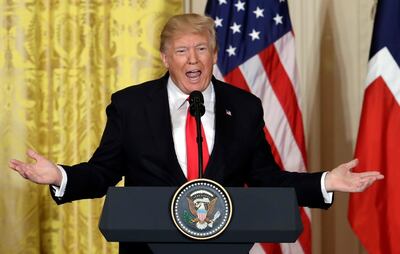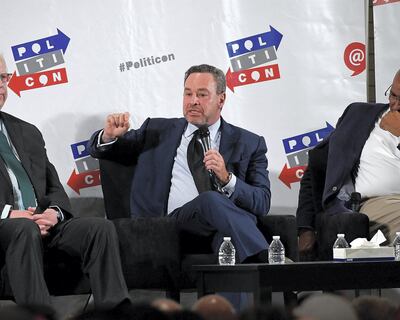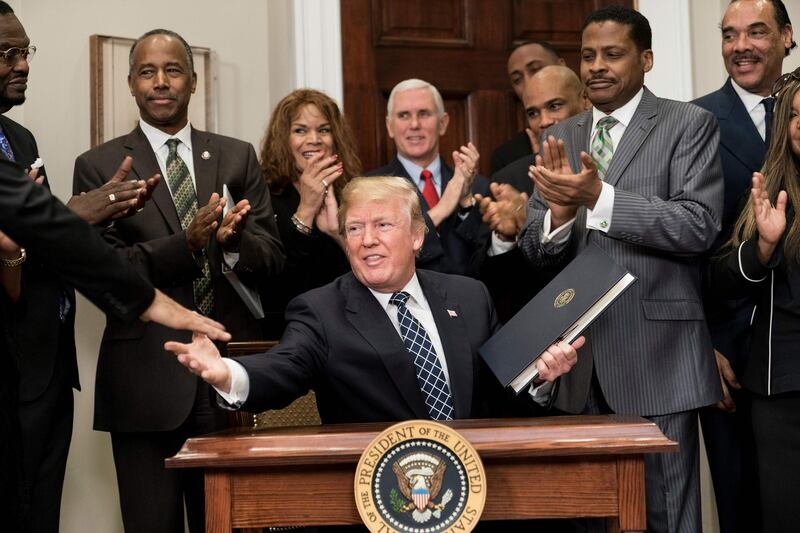It is chilling, edifying and ultimately uplifting, after Michael Wolff's breathlessly gossipy Fire and Fury, to read David Frum's trenchant new book.
Trumpocracy does not set out to examine the character of Donald Trump, although it does that better than almost any other book about the current occupant of the White House. Instead, the focus of Trumpocracy is relentlessly trained on the system that, having failed to stop Trump's ascent to the presidency, sustains him in power.
Writing off Trump as a buffoon came effortlessly to an establishment hopelessly in thrall to the deadly cult of American exceptionalism. Trump's string of victories in the Republican primaries, rather than alarm the Democrats, provoked frissons of excitement because they believed American democracy to be uniquely immune to the appeals of Trump-style populism. The "complacent optimism" that governed American politics, Frum writes, has been "upended by the political rise of Trump".
In 2016, Frum, a senior editor at The Atlantic, travelled through Hungary and studied that once-promising democracy's mutation, under Viktor Orban, into a quasi autocracy, arriving at the realisation that modern-day authoritarianism is animated not so much by ideology as it is by avarice.

“The benefit of controlling a modern state is less the power to persecute the innocent,” a wise observer of Hungary told him in Budapest, and “more the power to protect the guilty”. (I must disclose here that David Frum and I have been good friends for a number of years.)
Frum makes the case for Trump as the American autocrat, a home-grown strongman who seeks to achieve “not the bold overthrow of the constitution, but the stealthy paralysis of governance; not the open defiance of law, but a covert disregard of law; not the deployment of state power to intimidate dissidents, but the incitement of private violence to radicalise supporters”.
For a man who seems so unstable on the outside, Trump has a remarkable talent to intuit “the weak points in the American political system and American political culture”. (This, after all, is the man who made Fox News bend to his will.)
The pro-Trump constituency is peopled overwhelmingly by voters whose growing sense of alienation and disempowerment was for too long neglected by the politicians and commentators who today decry Trump. Many of them once voted for Barack Obama. Would they have migrated to Trump had their grievances not been disregarded?

Frum, who has been warning about the consequences of rising disparities for more than a decade, examines with great empathy and sensitivity the frustrations of ordinary Americans who fell behind Trump – without ever extenuating any of their rage or bigotry. The tragedy is that they have placed their faith in a man notorious for his betrayals. The wall on the border with Mexico will probably never be built; if it is, Mexico will not pay for it. The pledge to stay out of foreign wars will not be honoured.
____________________
Read more:
[ Fire, fury and the furore that surrounds the book of the moment ]
[ Book review: A look inside Michael Wolff's Fire and Fury which hastened Steve Bannon's downfall ]
____________________
Frum meticulously tabulates the United States government’s incapacitation by Trump, reminding us that some of the most vital organs of the state are still not properly staffed – and where they are, they are overseen by men and women from whom Trump has extracted pledges of personal loyalty. Cabinet meetings now begin with a round of panegyrics to Trump.
Between 2001 and 2002, Frum served as a speechwriter and special assistant to George W Bush. His bestselling memoir, The Right Man, detailed the inner workings of the Bush White House in the aftermath of the September 11 attacks. The presidency, he warns in Trumpocracy, is not restricted by the law but by traditions and norms – and Trump is driving a fist through them.
The Republican leadership in Congress has decided not only to ignore the accumulating allegations of the Trump campaign's collusion with Russia but even to safeguard the president. Paul Ryan, the speaker, is an ideologue desperate to push through his ambitious legislative agenda while Republicans still have the power to do it. But those who believe they can use Trump to their advantage are delusional, Frum warns. More likely than not, they are the ones being exploited by Trump. This president has a squalid record of breaking and discarding people who abase themselves to appease him.
The US military, meanwhile, has gained unprecedented autonomy during Trump’s first year in office. The volatile disposition of the president – his casual threats to annihilate North Korea; his seemingly endless fulminations on Twitter – can give rise to relief that he is being defied by his subordinates. Frum views this as profoundly damaging to the US’s civil-military relations in the long run: generals who have learnt to undermine this president may not want to relinquish the habit once he has exited the White House.
Frum’s characteristically refulgent prose is backed with compelling evidence – and the overall effect is devastating. But after itemising the injuries inflicted by Trump on the institutions of American democracy, Frum concludes the book on a hopeful note. “A new spirit of citizen responsibility is waking” in response to the threat to American democracy, he writes.
Trumpocracy is an essential book for our times – and not only for Americans. An incisive examination of creeping authoritarianism and an impassioned call to arms, it will resonate with readers in all the places – from Warsaw to Ankara and New Delhi to Manila – where democracy is in peril.






